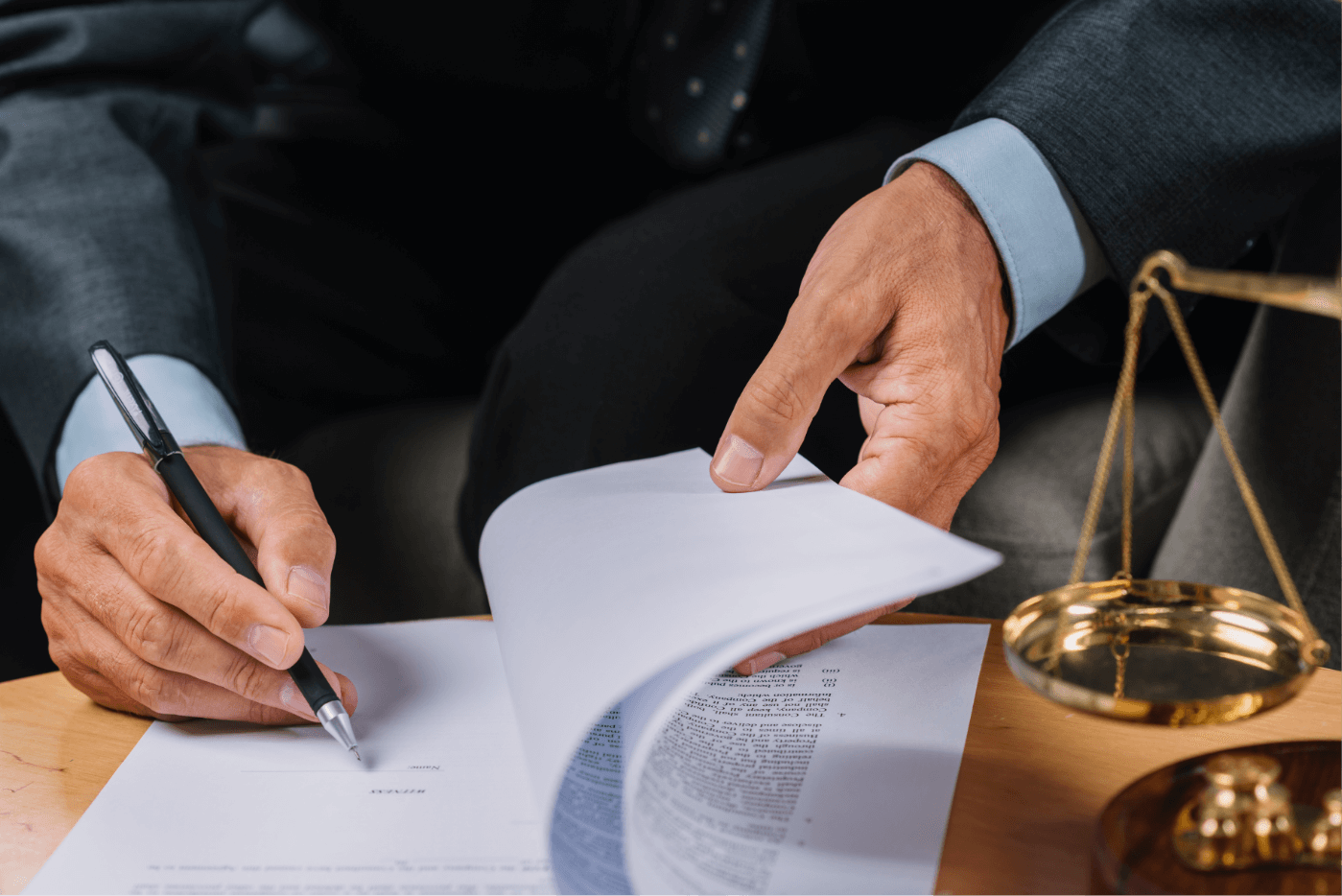Levy & Partners Practice Areas
Call Us: (954)727-8570
Levy & Partners Litigation Practice Areas
A portion of our litigation practice consists of handling of sophisticated business disputes. We represent clients in litigation involving public and closely held corporations, partnerships and corporate officers, directors and shareholders. Those disputes include counseling, pre-litigation settlement and trial of all varieties of commercial issues such as breach of contract, breach of warranty, business dissolutions, shareholder appraisal rights, bankruptcy-related disputes and a variety of business torts. Some examples include tortious interference with a contract or business, negligent misrepresentation, fraud in the inducement of a contract, and breach of fiduciary duty. We pursue and defend commercial litigation cases as traditional as the sale of goods under the uniform commercial code and as complex as the theft of internet passwords and domain names.
What does litigation mean?
Litigation refers to a case that is resolved through the use of the court process, rather than any of the out of court processes. However, Litigation does not always end in trial. Many parties are able to resolve their cases without the need for a trial, with the assistance of attorneys who act as dispute resolution consultants or settlement counsel, and who can work cooperatively even in a litigated case to reach settlement by agreement.
Finding attorneys who are not just litigators, but who are experienced in settlement techniques that can be applied in a litigated case, can be helpful in quickly and cost effectively resolving your case without the need for trial.
What is Commercial Litigation?
Commercial litigation is the same as litigation but involves legal disputes between businesses and/or individual people in matters pertaining to areas such as:
- Alternative Dispute Resolution methods, such as Arbitration and Mediation
- Breach of Fiduciary Duty
- Business Torts
- Buy/Sell Agreements
- Contract and Anti-Trust Litigation
- Dealer Termination
- Debtor/Creditor Disputes
- Dissolution of Business
- Commercial Employment Disputes
- Fraud
- Indemnification and Breach of Commercial Contract
- Limited Liability Company (LLC) Member Disputes
- Merger and Acquisition Litigation (including bank and bank holding company acquisitions)
- Partnership Disputes
- Secure Transactions
- Securities Litigation
- Shareholder Disputes and Derivative Actions
- Trade Secrets
- Unfair Competition
Types of Litigation Areas
Civil Litigation
This covers disputes between individuals, businesses, or organizations where one party seeks compensation or specific performance rather than criminal sanctions.
Personal Injury Litigation
For individuals who have been injured due to another party’s negligence or intentional actions, leading to claims for compensation for medical expenses, lost wages, and pain and suffering.
Real Estate Litigation:
Involves disputes over property, such as landlord-tenant conflicts, boundary disputes, breach of purchase agreements, and construction-related issues.
Family Law Litigation
Family Law Litigation covers legal issues related to families, including divorce, child custody, support disputes, and adoption.
Commercial Litigation
Involves disputes within the business context, such as contract breaches, partnership disputes, intellectual property infringement, and shareholder disagreements.
Employment Litigation
Employment Litigation encompasses disputes between employers and employees, including but not limited to wrongful termination, discrimination, harassment, and wage disputes.
Intellectual Property Litigation
Concerns disputes over patents, trademarks, copyrights, and trade secrets, involving infringement claims or ownership disputes.
Class Action Litigation
It involves a group of people collectively filing a lawsuit against a defendant or defendants who have caused similar harm, often in cases of consumer fraud, product liability, or securities fraud.
Criminal Litigation
In contrast to civil litigation, this involves cases brought by the government against individuals or entities accused of committing crimes, where the potential punishment includes fines, imprisonment, or other penalties.
Levy and Partners is simply phenomenal! Their expertise, attention to detail, and genuine care throughout my case were exceptional. They navigated my civil litigation precisely and achieved an outcome that surpassed my expectations. Their willingness to listen and address my questions and apprehensions made me feel truly supported. I highly recommend their services!
Civil Litigation
Civil litigation refers to the legal process used to resolve disputes between individuals, organizations, businesses, or government entities where one party (the plaintiff) seeks compensation, specific performance, or some other legal remedy from another party (the defendant). Here’s a deeper dive into civil litigation:
Types of Civil Litigation
Types of Civil Litigation:
-
Contract Disputes: Breach of contracts, disputes over terms, conditions, or performance of a contract fall under this category.
-
Tort Claims: These involve civil wrongs where one party’s actions cause harm or loss to another, such as personal injury claims or negligence.
-
Property Disputes: Boundary disputes, landlord-tenant issues, real estate transactions, and property damage claims fall within this realm.
-
Equitable Remedies: Sometimes, a plaintiff seeks remedies other than monetary compensation, such as injunctions (court orders to stop certain actions) or specific performance (forcing a party to fulfill their contractual obligations).
What are the steps involved in the litigation process?
Key Elements:
- Complaint: The process typically begins with one party filing a complaint outlining the alleged wrongdoing by the other party. This complaint details the legal and factual basis for the plaintiff’s claim.
- Response: The defendant responds to the complaint by filing an answer, admitting or denying the allegations and presenting their defense.
- Discovery: This phase involves gathering evidence through methods such as depositions, interrogatories, requests for documents, and subpoenas. Both parties exchange information to understand the strengths and weaknesses of their case.
- Pre-Trial Motions: Parties may file motions asking the court to decide certain issues before the trial, such as dismissing the case (motion to dismiss) or requesting summary judgment if there’s no genuine dispute of material facts.
- Trial: If the case proceeds to trial, both parties present their arguments, evidence, and witnesses before a judge or jury. The judge or jury then decides the case based on the presented evidence and arguments.
- Verdict and Appeals: The judge or jury delivers a verdict. If either party is dissatisfied with the outcome, they may appeal the decision to a higher court, alleging errors in the application of law or legal procedures.
How Long Does a Civil Litigation Case Take?
Parties often want to know the anticipated timeline of the case, but it’s challenging to predict accurately due to factors like court schedules, complexity, and negotiations.
What Evidence Do I Need for a Civil Litigation Case?
Litigants often ask about the necessary evidence to support their case. They seek guidance on what documents, witnesses, or information will strengthen their position.
What Are My Chances of Winning a Civil Litigation Case?
Assessing the strengths and weaknesses of a case is crucial. Litigants often seek an honest evaluation of their chances of success in court.
Do I Need Legal Representation in a Civil Litigation Case?
Many individuals wonder whether they can handle their case without an attorney or if legal representation is necessary for a successful outcome.
Levy & Partners’ insights on commercial litigation are a true beacon of clarity! It’s as if their team sat down and crafted a conversation rather than a dry legal breakdown. Their explanations are like having a friendly expert by your side, guiding you through the maze of legal complexities with ease.
For anyone seeking a knowledgeable, down-to-earth guide through the complexities of commercial litigation, Levy & Partners’ insights are a must-read. They’ve truly demystified the legal landscape and made it accessible to everyone.
Commercial Litigation
Commercial litigation involves legal disputes arising within the business context, encompassing various conflicts that may arise among companies, partners, shareholders, or entities. These disputes can cover a wide array of issues, including contract breaches, partnership disagreements, intellectual property disputes, employment disputes, breach of fiduciary duty claims, and shareholder disputes, among others.
It’s a complex area of law that demands a deep understanding of business operations, contractual agreements, industry regulations, and legal strategies. Levy & Partners specializes in commercial litigation, navigating through negotiations, mediations, and, if necessary, trial proceedings to resolve conflicts and safeguard their clients’ interests.
What Is Commercial Litigation?
Commercial litigation encompasses legal disputes that arise within business contexts. These disputes can involve contractual breaches, partnership conflicts, shareholder disagreements, intellectual property disputes, employment issues, and more. It’s a legal process where businesses seek resolutions for conflicts, often involving negotiations, mediation, or court proceedings to protect their interests and seek legal remedies.
How Long Does Commercial Litigation Typically Take?
The duration of commercial litigation varies widely based on factors like case complexity, court schedules, and the willingness of parties to negotiate or settle. Some cases might resolve within a few months through negotiation or mediation, while complex cases that proceed to trial can take several years to reach a resolution.
What Are the Costs Involved in Commercial Litigation?
The costs of commercial litigation can include attorney fees, court fees, expert witness fees, and other related expenses. Legal fees may be hourly-based or structured as contingency fees (based on case outcome). Additionally, the costs could escalate if the case prolongs or goes to trial.
What Are the Potential Outcomes of Commercial Litigation?
The outcomes of commercial litigation vary. If the case goes to trial, the court might issue a verdict favoring one party, resulting in monetary compensation or specific performance. However, settlements reached outside of court can include financial agreements, changes in business relationships, or other terms agreed upon by the parties involved.
I cannot emphasize enough the immense relief and support I received from engaging with a personal injury litigation team during one of the most challenging periods of my life. Suffering injuries due to someone else’s negligence had left me feeling helpless and overwhelmed. However, upon seeking assistance from a reputable law firm specializing in personal injury cases, my entire perspective shifted.
Personal Injury Litigation
Personal injury litigation involves legal disputes where individuals seek compensation for injuries sustained due to someone else’s negligence or intentional actions.
What does compensation for Personal Injury case cover?
Compensation: If successful, compensation in personal injury cases (also known as damages) may cover:
- Medical Expenses: Costs for past and future medical treatments, surgeries, therapy, medications, and assistive devices.
- Lost Wages: Compensation for income lost due to inability to work during recovery or permanently.
- Pain and Suffering: Non-economic damages for physical pain, emotional distress, and loss of enjoyment of life.
- Punitive Damages: In cases of egregious conduct, courts may award additional punitive damages to punish the defendant and deter similar behavior.
What types of Personal Injury Cases are there?
Types of Cases: Personal injury cases encompass a wide range of incidents, including:
- Vehicle Accidents: Car, motorcycle, truck accidents, and pedestrian accidents.
- Slip and Fall Injuries: Accidents occurring on someone else’s property due to hazardous conditions.
- Medical Malpractice: Injuries caused by medical errors, misdiagnosis, or negligence by healthcare providers.
- Product Liability: Injuries caused by defective products or inadequate warnings.
- Workplace Accidents: Injuries suffered in the workplace due to unsafe conditions or employer negligence.
- Assault and Battery: Injuries resulting from intentional harm or violence by another person.
Legal Basis: To succeed in a personal injury case, the plaintiff (injured party) must demonstrate that the defendant owed a duty of care, breached that duty, and caused the injuries through negligence or intentional action. Proving these elements often requires evidence gathering, witness testimonies, expert opinions, and legal arguments.
What is the role of Personal Injury Attorney?
Role of Personal Injury Attorneys: Lawyers specializing in personal injury law advocate for their clients by:
- Investigating the incident and gathering evidence.
- Advising on legal options and potential compensation.
- Negotiating with insurance companies.
- Representing clients in court if a trial is necessary.
What is the statue of limitations on Personal Injury cases?
Statute of Limitations: There’s a time limit for filing a personal injury lawsuit, varying by state and the type of injury. It’s crucial to consult an attorney promptly after an injury to understand and protect your rights within this time frame.
Personal injury litigation aims to provide fair compensation to victims and hold responsible parties accountable for their actions, helping individuals recover from their injuries and regain stability in their lives.
“Working with Levy & Partners has been an absolute game-changer for me. I was facing a complex real estate dispute, and their expertise and dedication turned the tide in my favor. The team’s professionalism and attention to detail were exceptional. They navigated the intricacies of my case with expertise, offering clear guidance at every step. Their ability to secure a favorable outcome exceeded my expectations. I highly recommend Levy & Partners to anyone seeking top-notch legal representation. Thank you for your outstanding service!”
Employment Litigation
Employment litigation often involves complex legal procedures and can be emotionally charged. It may start with administrative complaints filed with government agencies such as the Equal Employment Opportunity Commission (EEOC) or proceed directly to civil lawsuits in state or federal courts. Levy & Partners specializing in employment law can help navigate these disputes, providing legal counsel, representing clients in negotiations, and advocating for their rights in court if necessary. The goal is to seek remedies such as compensation for damages, reinstatement, changes in workplace policies, or other appropriate relief.
What steps should I take if I believe I'm facing discrimination or harassment at work?
If you’re experiencing discrimination or harassment, document the incidents, report them to your employer following internal procedures, and consider seeking advice from an attorney experienced in employment law. Retaining records can be crucial if legal action becomes necessary.
What is Employment Litigation?
Employment litigation encompasses legal disputes arising in the workplace between employers and employees. These disputes cover a broad range of issues and can involve various legal claims and actions. Here are some key aspects of employment litigation:
-
Discrimination and Harassment: Employees might file lawsuits alleging discrimination or harassment based on factors such as race, gender, age, disability, religion, or sexual orientation. Claims may arise from wrongful termination, demotion, denial of promotion, or hostile work environments.
-
Wrongful Termination: Employees might bring claims against their employers for wrongful termination, asserting that they were fired for unlawful reasons such as retaliation for whistleblowing, exercising legal rights, or discriminatory motives.
-
Wage and Hour Disputes: These involve claims related to unpaid wages, overtime violations, minimum wage violations, misclassification of employees as exempt from overtime pay, or failure to provide required breaks.
-
Contract Disputes: Employees might sue over breach of employment contracts, including issues related to compensation, benefits, non-compete clauses, or severance agreements.
-
Retaliation Claims: Employees who face adverse actions from employers as retaliation for reporting illegal activities, discrimination, or unsafe working conditions may file lawsuits alleging retaliation.
-
Workplace Safety: Legal actions can arise if an employee is injured on the job due to employer negligence in providing a safe work environment or failing to comply with safety regulations.
Employment litigation often involves complex legal procedures and can be emotionally charged. It may start with administrative complaints filed with government agencies such as the Equal Employment Opportunity Commission (EEOC) or proceed directly to civil lawsuits in state or federal courts. Lawyers specializing in employment law help navigate these disputes, providing legal counsel, representing clients in negotiations, and advocating for their rights in court if necessary. The goal is to seek remedies such as compensation for damages, reinstatement, changes in workplace policies, or other appropriate relief.
How long do I have to file an employment-related lawsuit?
The statute of limitations varies depending on the type of claim and jurisdiction. It’s crucial to act promptly since there are specific time limits within which legal action must be initiated. Consulting an attorney early on can ensure you understand these deadlines.
What compensation or remedies can I seek through employment litigation?
Remedies in employment lawsuits may include financial compensation for lost wages, emotional distress, punitive damages in some cases, reinstatement to your job, changes in company policies or practices, or other specific remedies tailored to your situation.
Can I sue my employer for wrongful termination?
Wrongful termination claims often depend on specific circumstances. Generally, if your termination violates state or federal law, such as being fired due to discrimination, retaliation, or breach of contract, you may have grounds for a lawsuit.
What should I expect during the employment litigation process?
The process typically involves investigation, negotiation, and, if necessary, litigation. This might include filing administrative charges, responding to requests for information, mediation or settlement negotiations, and potentially a trial if the case proceeds to court.
From the initial consultation to the resolution of my case, their attorneys were attentive, responsive, and incredibly knowledgeable. They took the time to understand every detail of my situation and provided clear guidance throughout the entire process. Their professionalism and commitment to achieving the best possible outcome were evident at every step.
Real Estate Litigation
Real estate litigation involves a combination of negotiation, mediation, and, if necessary, court proceedings to resolve conflicts. Levy & Partners specialize in real estate litigation to navigate complex laws, review contracts and agreements, gather evidence, and represent clients in hearings or trials to protect their rights and interests concerning property matters. Resolving these disputes often requires a deep understanding of real estate law, local regulations, and a strategic approach tailored to each unique case.
What is the typical duration of a real estate litigation case?
The duration can vary significantly based on the complexity of the case, jurisdictional factors, and whether settlements are reached outside of court. Some cases might resolve in a few months, while others involving intricate issues or appeals could extend for years.
What are common reasons for real estate litigation?
Real estate litigation involves legal disputes related to property, encompassing a broad range of conflicts arising from transactions, ownership, development, and land use. Here are some key aspects:
1. Purchase and Sale Disputes: These disputes revolve around breaches of contracts between buyers and sellers. For instance, if a seller fails to disclose property defects or if a buyer refuses to complete the purchase, it can lead to litigation.
2. Landlord-Tenant Disputes: Issues may arise regarding lease agreements, evictions, rent increases, or property maintenance responsibilities. Litigation can address breaches of lease terms, illegal evictions, or disputes over security deposits.
3. Boundary and Easement Disputes: Conflicts arise when property lines, boundaries, or easements (the right to use someone else’s land) are contested. These cases can involve encroachments, disagreements over land use rights, or access to certain areas of the property.
4. Construction Disputes: These involve conflicts between property owners, contractors, subcontractors, or architects. Disputes may arise due to construction defects, delays, payment issues, or disagreements over the quality of work.
5. Title Disputes: These disputes concern issues with property titles, including ownership claims, title defects, or conflicting claims arising from wills, trusts, or prior conveyances.
6. Zoning and Land Use Disputes: Matters related to zoning regulations, land development permits, or government actions impacting property use can lead to litigation. This includes disputes over rezoning decisions or restrictions on property use.
7. Homeowner Association (HOA) Disputes: Litigation may arise from conflicts between homeowners and HOAs regarding enforcement of rules, assessments, common area maintenance, or interpretation of covenants and bylaws.
How much does it cost to pursue real estate litigation?
The costs depend on various factors, including attorney fees, court fees, expert witness fees, and other related expenses. The complexity and duration of the case also impact costs. Attorneys may charge hourly rates or work on a contingency fee basis in some instances.
Can real estate disputes be resolved without going to court?
Yes, many disputes are settled through negotiation, mediation, or arbitration outside of court. These methods often save time, costs, and maintain privacy. However, if parties cannot reach a resolution through these means, court intervention might be necessary.
What types of evidence are crucial in real estate litigation?
Evidence may include contracts, correspondence, property deeds, surveys, inspection reports, photographs, financial documents, and witness testimonies. Comprehensive documentation supporting claims or defenses is essential in these cases.
Your firm’s exceptional legal expertise and unwavering support made a challenging real estate dispute manageable. The personalized attention, clear communication, and successful resolution surpassed my expectations. Thank you for your professionalism and dedication.
Moreover, your firm’s ability to secure a favorable resolution exceeded my expectations. Your expertise in real estate litigation was evident in the meticulous preparation, adept negotiation skills, and unwavering advocacy demonstrated during proceedings.
Intellectual Property Litigation
IP litigation involves disputes over patents, trademarks, copyrights, and trade secrets. Law firms specializing in this area, like Levy & Partners, often handle cases such as:
Patent Infringement: Representing clients in cases where a patented invention or process has been unlawfully used, manufactured, or sold by another party without permission.
Trademark Disputes: Assisting clients in protecting their brand identity by addressing issues like trademark infringement, dilution, or counterfeiting.
Copyright Infringement: Defending the rights of creators and content owners against unauthorized use, reproduction, or distribution of their copyrighted works.
Trade Secret Protection: Assisting companies in safeguarding confidential and proprietary information, and litigating cases involving misappropriation or theft of trade secrets.
What are the potential outcomes or settlements for my case?
Outcomes depend on the specifics of each case and the evidence presented. Levy & Partners will assess the strengths and weaknesses of your case and discuss potential outcomes or settlement possibilities during consultations.
Levy & Partners specializing in IP litigation, their services include:
- Case Evaluation: Assessing the merits of a client’s claims or defenses in an IP dispute.
- Litigation Strategy: Developing a comprehensive legal strategy tailored to the specific case and client’s objectives.
- Court Representation: Advocating for clients in court proceedings, including hearings, trials, and appeals.
- Settlement Negotiations: Seeking favorable settlements through negotiation or alternative dispute resolution methods.
- Enforcement and Defense: Protecting clients’ intellectual property rights or defending against infringement allegations.
How much will it cost to hire an attorney?
Legal fees can vary based on factors like the complexity of the case, the attorney’s experience, and the billing structure (hourly rates, contingency fees, flat fees). Levy & Partners offers transparent fee structures tailored to specific cases and provides initial consultations to discuss potential costs.
How long will my case take to resolve?
The duration varies widely based on case complexity, court schedules, negotiations, and other factors. Levy & Partners can provide estimates based on their experience with similar cases but timelines can be unpredictable due to various legal processes.
What are the potential outcomes or settlements for my case?
Outcomes depend on the specifics of each case and the evidence presented. Levy & Partners will assess the strengths and weaknesses of your case and discuss potential outcomes or settlement possibilities during consultations.
Family Law Litigation
Levy & Partners’ family law practice likely focuses on providing compassionate guidance, personalized strategies, and strong advocacy to help clients navigate emotionally challenging family-related legal issues with care and expertise. Their aim would be to achieve fair and amicable resolutions while safeguarding the best interests of their clients and their families.
Do I need to hire an attorney for a family law issue?
While legal representation is not mandatory, having an experienced family law attorney, like Levy & Partners, can ensure that your rights are protected and that you navigate the complexities of family law effectively.
What does Family Law Include?
Divorce and Separation: Assisting clients through the divorce process, including issues related to asset division, child custody, visitation rights, and spousal support.
Child Custody and Support: Helping parents establish custody arrangements that serve the best interests of the child, and ensuring fair child support agreements.
Adoption: Guiding clients through the legal processes involved in adopting a child, whether it’s domestic adoption, international adoption, or step-parent adoption.
Prenuptial and Postnuptial Agreements: Drafting legally binding agreements that outline asset division and other matters in case of divorce or separation.
Domestic Violence and Protective Orders: Representing clients in cases involving domestic abuse or seeking protective orders to ensure their safety and the safety of their family members.
How long does the divorce process take?
The duration of a divorce case varies based on factors like state laws, the complexity of assets, and whether it’s contested or uncontested. Levy & Partners can offer estimates based on their experience but timelines can fluctuate due to case specifics and court schedules.
How is child custody determined?
Child custody decisions prioritize the best interests of the child, considering factors like parental involvement, the child’s preferences (if mature enough), and the ability to provide a stable environment. Levy & Partners can help negotiate custody arrangements or represent clients in court to determine custody.
Can child support or alimony payments be modified?
Under certain circumstances, child support or alimony arrangements can be modified. Significant changes in financial circumstances or the needs of the child may warrant modification. Levy & Partners can assist in filing petitions for modification.
What are the grounds for divorce in our state?
Different states have various grounds for divorce, including no-fault grounds (irreconcilable differences) or fault-based grounds (such as adultery or abuse). Levy & Partners can clarify the specific grounds applicable in the client’s state.
“Levy & Partners’ exceptional expertise and unwavering commitment shone brightly throughout our class action lawsuit. Their transparent communication, legal acumen, and successful resolution were truly impressive. Highly recommend their services for anyone seeking top-notch representation in complex litigation.”
Class Action Litigation
A class action litigation involves a group of individuals collectively bringing a lawsuit against a defendant or defendants who have caused similar harm. This legal mechanism allows a large number of plaintiffs with similar claims to join together and pursue justice as a unified group.
What are the advantages of a class action lawsuit over individual lawsuits?
Class actions consolidate similar claims, reducing legal costs and time. They ensure fairness and equal treatment for all affected individuals, especially when claims might be too small to pursue individually.
Law firms specializing in class action litigation, like Levy & Partners, often handle cases such as:
Consumer Protection: Representing consumers harmed by defective products, false advertising, or unfair business practices.
Securities Fraud: Advocating for investors who have suffered losses due to fraudulent activities or misrepresentations by corporations.
Employment Disputes: Representing employees in cases involving wage violations, discrimination, or unlawful labor practices.
Product Liability: Pursuing legal action against manufacturers for defective products causing widespread harm or injury.
Levy & Partners play a crucial role in class action lawsuits by:
- Investigating Claims: Assessing the validity of claims and determining if they warrant a class action lawsuit.
- Building a Strong Case: Gathering evidence, identifying affected individuals, and building a robust legal strategy.
- Court Representation: Advocating for the collective interests of the plaintiffs in court, negotiating settlements, and, if necessary, proceeding to trial.
Class action litigation aims to provide efficient and fair resolutions for a large group of individuals who have suffered similar harm. Law firms like Levy & Partners focus on achieving justice for the collective while upholding the rights of each member of the class involved in the lawsuit.
Who can join a class action lawsuit?
Individuals who have been similarly affected by the actions of a defendant or defendants can typically join a class action lawsuit. Levy & Partners can assess eligibility during consultations.
How long does a class action lawsuit typically take to resolve?
The duration varies widely based on factors like case complexity, negotiations, and court procedures. Levy & Partners can provide estimates based on their experience, but timelines can fluctuate.
I cannot express enough gratitude for the exceptional legal support provided by Levy & Partners during a challenging legal matter. Their expertise, dedication, and unwavering commitment were beyond remarkable.
Criminal Litigation
Levy & Partners play a critical role in criminal litigation by providing comprehensive legal representation, ensuring clients receive fair treatment, and vigorously defending their rights. They offer legal expertise, strategic guidance, and advocacy to navigate the complexities of the criminal justice system and protect their clients’ interests.
What should I do if I've been arrested or charged with a crime?
Contact an attorney immediately. Levy & Partners can provide legal advice, protect your rights during police questioning, and represent you in court proceedings.
What kind of criminal cases does Levy & Partners handle?
Defense Representation: Defending individuals facing criminal charges, ensuring their rights are protected, and providing legal counsel throughout the legal process.
Trial Advocacy: Representing clients in court proceedings, including arraignments, pre-trial hearings, trials, and appeals, advocating for fair treatment and favorable outcomes.
Investigation and Evidence: Conducting thorough investigations, gathering evidence, and building a strong defense strategy to challenge prosecution evidence or witness testimonies.
Negotiating Plea Bargains: Negotiating with prosecutors to secure reduced charges or penalties through plea bargains, aiming to achieve the best possible outcome for their clients.
Post-Conviction Relief: Assisting clients with post-conviction matters, such as appeals, sentence modifications, or seeking relief from convictions based on new evidence or legal errors.
What are my rights when interacting with law enforcement?
You have the right to remain silent and the right to an attorney. You are not obligated to answer questions without legal counsel present. Levy & Partners can advise you on exercising your rights.
What are the potential consequences of a criminal conviction?
Consequences may include fines, probation, imprisonment, or a criminal record affecting employment and other opportunities. Levy & Partners can explain the potential implications based on the specific charges.
How can a criminal defense attorney help my case?
A criminal defense attorney, like Levy & Partners, can assess your case, build a defense strategy, negotiate with prosecutors, and represent you in court to pursue the best possible outcome.
Get A Free Consultation
Blog & News


COVID-19 Canceled Vacation But No Refund? Class Action Claims Rentals Firm Illegally Withholding Money
Vacation plans across the U.S. were canceled once the coronavirus pandemic set in, but a new lawsuit claims some who lost out on their dream Florida trip aren’t getting refunds they’re entitled to. A putative class action against Florida luxury homes rental company...


House version of claims reform bill omits one-way attorney fee ban
A new House bill aims to reduce costly litigation against insurers by forcing benefits assignees to risk paying insurers’ attorneys fees if they lose.
Subscribe to Our Newsletter
Get news, tips and stay informed to have a higher chance of protecting your rights! Subscribe today and start receiving valuable information.
Address
3230 Stirling Rd Suite 1, Hollywood, FL 33021
1200 Brickell Avenue, Suite 1800, Miami, Florida 33131
Hours: Mon - Fri
9 am - 5 pm
Contact Us
Phone: (954) 727-8570
Email: info@lawlp.com








